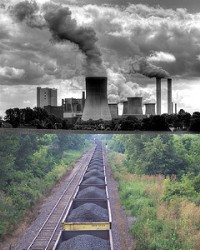cellulosic ethanol
-
Two takes on school lunches, plus other tasty morsels from around the web
When my info-larder gets too packed, it’s time to serve up some choice nuggets from around the Web. —————- Get ’em while they’re hot. • In today’s New York Times, Kim Severson’s got a wonderful report on one New York City school cafeteria’s quest to cook as much as possible from scratch. The piece has […]
-
Electric cars get better mileage
From a study published in this week’s Science Express ($ub Req’d): Bioelectricity produces an average 81% more transportation kilometers and 108% more emissions offsets per unit area cropland than cellulosic ethanol… Given the limited area of land that is available to grow biofuels crops without causing direct or indirect land use impacts, bioenergy applications should […]
-
The DOE’s annual biofuels conference doesn’t inspire confidence
Team Ethanol got together recently at the Department of Energy for Biomass 2009: Fueling Our Future — a conference on all things biofuel. Needless to say, they’re still singing the same old song. More subsidies, a higher blend wall (a cheer that USDA Chief Tom Vilsack knows well) and much crowing over the promise of […]
-
On the challenge of cellulosic ethanol
"There is only one problem: the United States is not producing any second-generation non-corn ethanol in significant quantities at the moment. So a whole new industry will have to be brought into existence within less than four years and become one of the largest industries in the United States within the next 10 years."
-- Reuters columnist John Kemp, "Obama's Biofuel Challenge"
-
Cellulosic ethanol ranks dead last
Mark Jacobson (associate professor of civil and environmental engineering, Stanford University) has just published a paper in the journal of the Royal Society of Chemistry. You can read the entire article here (PDF). BEV = battery electric vehicle HFCV = hydrogen fuel cell vehicle CSP = concentrated solar panels PV = photovoltaic CCS = carbon […]
-
Khosla’s letter to Science backfires
Vinod Khosla has a letter in the Oct. 17 issue of Science ($ub. req’d) critiquing the Searchinger et al study: “U.S. croplands for biofuels increases greenhouse gases through emissions from land-use change.” Question: Why would the editors at Science publish a letter from someone who is not a biologist or a peer of the researchers […]
-
AP: cellulosic ‘not even close’ to being ready to satisfy government mandates
For a while, I’ve been wishing I had time to write a feature on cellulosic ethanol, the allegedly "green" biofuel that’s been "five years away" from commercial viability for about, oh, two decades. Government mandates — backed by a plethora of tax breaks, grants, and other goodies — require production of 16 billions of the […]
-
Not all biofuels are the same; we can do biofuel well or poorly
To my surprise, recently I found myself the subject of an editorial by the Wall Street Journal which characterized me as a strong advocate of subsidies for food-based ethanol, and as a recipient of "federal dole" who ought to "take a vow of embarrassed silence."
I have not advocated subsidies for food-based ethanol. In fact, I strongly believe any nascent technology that cannot exist without subsidies beyond an introductory period will not gain market penetration, and is not worth supporting.
I do look forward to the WSJ's complaints about oil's subsidy bonanza, from tax breaks for drilling, loopholes that allow royalty-free or below-market offshore oil leases, manufacturing tax breaks, as well as roughly $7 billion in subsidies in the wake of the Katrina disaster. At a recent WSJ Conference, 75 percent of the erudite audience "voted" (rightly) that oil was more highly subsidized than ethanol.
Were these not such serious matters, the WSJ editorial would be laughable. But there are serious issues at stake. Should we not look past our noses to the larger issues of dependence on oil? The alternative of biofuels raises serious questions deserving more depth than the entrenched, one sided views of the Wall Street Journal.
-
Wall Street Journal editorial mischaracterizes both my position and biofuels
To my surprise, on Tuesday I found myself cited by the Wall Street Journal as a strong advocate of subsidies for food-based ethanol, and as a recipient of "federal dole" who ought to "take a vow of embarrassed silence." While I appreciate the Journal's foray into fiction writing (and I'd love to discuss my status on the dole with my accountant, who recently filed my taxes), I would like to clarify a few facts and offer a more rounded view of biofuels and ethanol in general.
A few facts:

